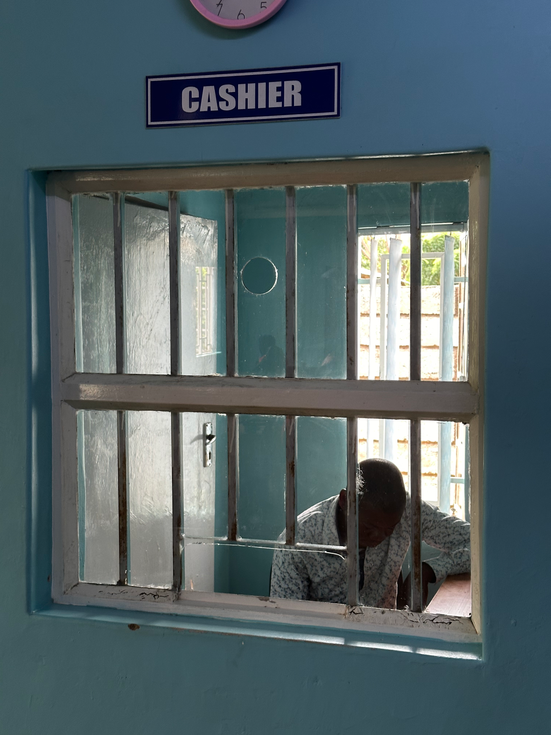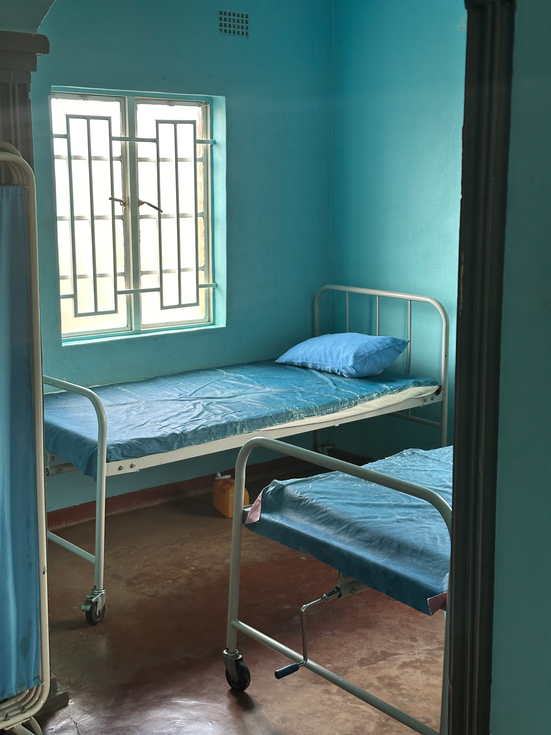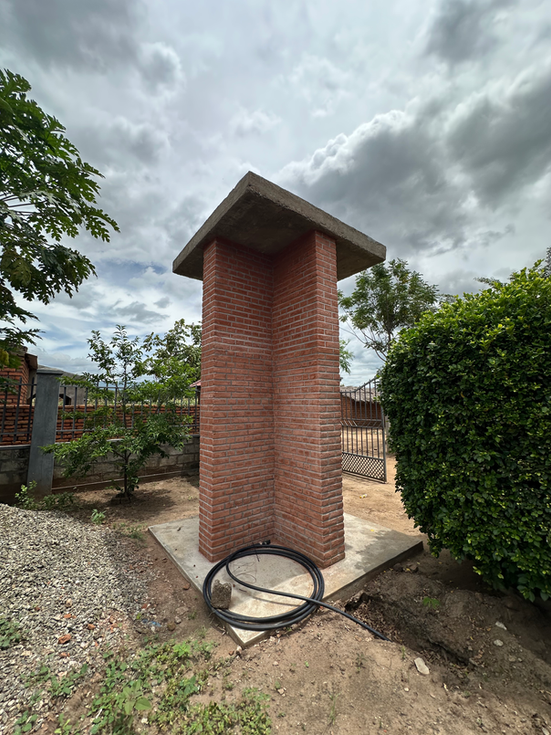Completion of the Project "Water Supply for the Luntha Clinic" – 31 August 2025
- Colin
- Sep 1, 2025
- 5 min read
I. Project Description
Since the founding of our association in 2017, we have been committed to school projects as well as projects in the field of medical care in Malawi. The GF Goeldner Foundation, the local and regional authorities in Malawi (Village Chiefs and Traditional Authority), and the Diocese of Dedza have been working closely together since that time. Our visits also lead us to the surroundings of Mganja, the location of our first major project, the Tiyende Pamodzi Girls Secondary School. In this area lies the small town of Golomoti; there we want to support and promote a small privately run clinic in its further development.
1. History of the Clinic and its Founder
The operator of this small clinic is Frank Banda. Frank is a Malawian citizen, 47 years old, married and has three children. He was born in 1977 in Mua and attended primary school in Mganja. In 1992 he passed the entrance examination of the state secondary school. At the same time, he was the first boy from Mganja ever to be allowed to attend a secondary school in the region. Afterwards, he attended the Malawi College of Health Sciences and obtained an advanced diploma in clinical medicine with a focus on medicine, pediatrics, surgery, and obstetrics/gynecology. Frank then worked for ten years in state/municipal hospitals and in church hospitals.
In 2004 Banda decided to found a small village clinic in Golomoti. It began with a small treatment room, which was gradually expanded in line with economic possibilities through his own efforts. As part of his professional training, Frank Banda obtained the authorization under Malawian law to operate this private clinic. His degrees and certificates include, among others:
Diploma in Clinical Medicine with a focus on Surgery, Medicine, Pediatrics, and Obstetrics/Gynecology
Certificates for HIV testing and counseling, for the treatment of sexually transmitted infections, for the implementation of Highly Active Antiretroviral Therapy (HAART), family planning, counseling in contraception, nutrition, and rehabilitation in cases of malnutrition
The GF Goeldner Foundation and Frank Banda agreed that after implementation of the measures the clinic would expand its free treatment service. In particular, these free services are to be offered in the surrounding villages.
2. Support of the Clinic
From our point of view, the clinic was and is worthy of support.
It is a small clinic already in existence, which was built up through the high personal commitment of the private operator; it is growing slowly and continuously according to Banda’s financial and time resources. In our opinion, it makes sense to further strengthen and equip this clinic, since this achieves several effects:
The Luntha Clinic offers a free treatment program for very poor and needy people such as orphans and elderly people, and intends to extend its program to many other vulnerable groups who cannot afford good health care.
The private commitment of Frank Banda serves the residents of Golomoti and the surrounding villages. Frank creates an income base for himself and his employees. This in turn inspires young people to become engaged in the medical field and to train themselves in medical professions.
The completion of internships by foreign medical students or trainees is possible, foreign doctors can also work in the clinic and be active within aid programs and even now perform small surgical procedures.
The village clinic has a total of 10 employees who take care of patients and clients with commitment. The clinic thus serves a larger community in Golomoti and the surrounding area.
Free early childhood preventive health check-up
3. Golomoti (Geographic Location)
Golomoti is a rapidly growing trading center in a stable political environment in Dedza District near the Mozambican border; with this growth comes the need for basic medical care and education. According to available data, Golomoti has a catchment population of over 40,000 people. Due to the crowded living space in partly very simple huts, the humid-warm climatic conditions, and the not always good hygienic conditions, they are exposed to considerable – and preventable – health risks. Golomoti has only a single small state health center with very limited resources in terms of medical supplies, medicines, and important medical equipment to enable good diagnosis and treatment. This repeatedly leads to preventable deaths. Good medical health care helps to avoid serious illnesses and deaths caused by easily treatable diseases and by prevention through counseling and education.
4. Location of the Buildings
On the clinic grounds there is a used and a still unused (shell construction) area, which Frank Banda is gradually expanding according to his financial means. The shell construction building has three large rooms intended for a future radiology, a laboratory, and the operating room for surgical procedures.
Shell construction
The currently used building has two treatment rooms, an observation room with two beds, two toilet rooms, a mini laboratory room, a changing room, which is currently temporarily used as a scan room, a medication room, a small cashier’s room, and a reception area.
Treatment & waiting rooms
II. Support Measures
Before the start of the project, the clinic had no running water. Only a well outside the building was available, from which the water had to be laboriously drawn by hand and carried into the treatment rooms. This significantly impaired hygiene standards.
As part of the project, we were able to fundamentally improve the water supply. The measures carried out included:
Drilling a groundwater borehole to provide a reliable and clean water source directly on the clinic premises.
Construction of a water tower with solar pump, which ensures a continuous water supply without an external power source.
Construction of a septic tank for proper wastewater disposal.
Laying of water pipes to the various areas of the clinic.
Construction of modern sanitary facilities with toilets, showers, and washbasins for patients and medical staff.

borehole drilling (well)
Laying of the water pipes, septic tank
Thanks to these measures, the clinic now has running water in all relevant rooms as well as hygienic sanitary facilities. This makes a significant contribution to improving medical care and to meeting important hygiene standards.
Water tower, solar pump, washbasins inside and outside, shower
IV. Project Partners
The GF Goeldner Foundation e.V. monitored the implementation of the work from Germany as well as on site and regularly reported to the donors and members of the association. The funds were raised through charitable organizations and individual donors in Germany.
The Luntha Clinic under the leadership of Frank Banda was the direct beneficiary and cooperation partner on site. Mr. Banda carefully supervised the construction work at his clinic and ensured that the work was carried out properly and in accordance with the project objectives.
Our close and permanent partner, the Nazareth Human & Spiritual Development Trust, took over communication on site in our absence, advised on project issues, and carried out external controls of the implementation.
The Diocese of Dedza took over the management and disbursement of project funds, advisory tasks, and additionally supported the monitoring of project progress.
IV. Outlook
The GF Goeldner Foundation will continue to make every effort to improve the living conditions of the people in the Mganja region. We will continue to observe the success of the measures (maintenance and servicing by the staff), also with regard to the promised return service (free care of needy patients), and will if necessary provide further support. We are convinced that the Luntha Clinic makes a decisive and indispensable contribution to rural health care in Malawi.
We thank our members, various individual donors as well as charitable organizations who made the project possible through their support.
Video by Frank Banda
































































































